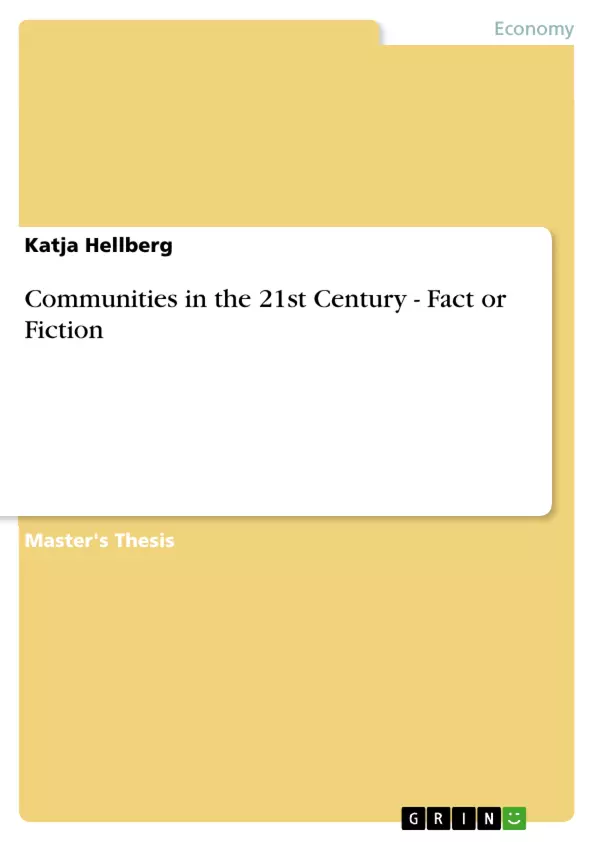In today’s globalised world, characterized by individualism, there is a trend
“backwards” to community building, as human beings are increasingly looking for a
social link. These communities of the twenty- first century are held together through
shared emotions, style of live, and consumption practice. Applying this to the field of
marketing might provide marketers a better understanding of customers’ wants and
needs, namely that of communal feeling. This idea is the basis for the underlying
study, which extends on previous research of brand communities. It contributes to
earlier studies by exploring brand communities in a different setting. Moreover, it
contributes by investigating upon relationship marketing characteristics and their
existence in brand communities.
A brand community can be defined as a specialized, non-geographically
bound community, based on four distinct relationships a focal customer engages in.
These are customer-product, customer-brand, customer-company, and customercustomer
relationships. A brandfest, where customers of a brand come together in
order to ‘celebrate’ the brand and share their common interest, can provide the social
context, and geo-temporal concentration, which adds meaning to the customers’
consumption experience and thus enforces or reinforces relationships. In order to truly
benefit from brand communities, the relationships therein should be characterised by
trust, affect, and commitment, and should lead to sustainable loyalty.
In order to find out whether brand communities exist in a different product
category than automobiles, the board game Kolonisten van Catan was chosen. The
automobile product category is characterised by both high pleasure potential (hedonic
value) and high functional value (utilitarian value). In contrast, the toys product
category (to which Kolonisten van Catan belongs) has a high pleasure potential, and a
low functional value, and is therefore useful to determine whether there are
differences due to the product category. The relationships mentioned above were
examined in the context of a brandfest; the Dutch National Kolonisten van Catan
competition. The participants were questioned about their relationships with the
product, the brand, the company, and other customers, in order to find out whether
those are positive. [...]
Inhaltsverzeichnis (Table of Contents)
- INTRODUCTION
- NEW PERSPECTIVES OF RELATIONSHIP MARKETING
- Problem Statement
- Subquestion
- DELIMITATIONS OF THE STUDY
- CONTRIBUTION
- Theoretical Contribution
- Practical Contribution
- CHAPTER OUTLINE
- BRAND COMMUNITIES
- INTRODUCTION
- BRAND COMMUNITIES
- THE KOLONISTEN VAN CATAN COMMUNITY
- SUMMARY
- RELATIONSHIP MARKETING
- INTRODUCTION
- ASPECTS OF RELATIONSHIP MARKETING
- Relationship Marketing Definitions
- Summary Relationship Marketing Definitions
- TRUST
- COMMITMENT
- SUMMARY
- BRANDING
- INTRODUCTION
- BRANDS VS. PRODUCTS
- Products
- Brands
- CUSTOMER-BRAND RELATIONSHIPS
- Conceptualisation
- Determinants of Brand Relationship Quality
- Hypotheses Development
- BRAND TRUST AND BRAND AFFECT
- BRAND LOYALTY
- Components of Loyalty
- SUMMARY
Zielsetzung und Themenschwerpunkte (Objectives and Key Themes)
The study aims to explore the existence and potential of brand communities in a setting outside of the automotive product category. It investigates the relationship marketing characteristics present in these communities, focusing on the customer-product, customer-brand, customer-company, and customer-customer relationships. The study uses the Kolonisten van Catan board game and its brand community as a case study to investigate these relationships.
- The existence and potential of brand communities in a product category outside of automobiles.
- The relationship marketing characteristics within brand communities.
- The role of trust, affect, and commitment in building sustainable loyalty within brand communities.
- The impact of brand communities on relationship marketing and branding theory.
- The potential of brand communities as a competitive advantage for businesses.
Zusammenfassung der Kapitel (Chapter Summaries)
The introductory chapter sets the stage for the study by exploring new perspectives on relationship marketing, specifically in the context of community building in today's globalized world. It outlines the problem statement and subquestion guiding the research, delineates the scope of the study, and highlights its theoretical and practical contributions. The chapter concludes with an outline of the subsequent chapters. Chapter 2 delves into the concept of brand communities, defining them as non-geographically bound communities based on four distinct customer relationships. It explores the concept of brandfests and their role in strengthening these relationships. Chapter 3 examines the key aspects of relationship marketing, including definitions, trust, and commitment. It emphasizes the importance of these elements in fostering sustainable loyalty. Chapter 4 dives into the realm of branding, differentiating between products and brands and exploring the significance of customer-brand relationships. It discusses determinants of brand relationship quality, hypothesis development, and the role of brand trust, brand affect, and brand loyalty.
Schlüsselwörter (Keywords)
The main keywords and focus topics of the text include brand communities, relationship marketing, brand loyalty, trust, affect, commitment, Kolonisten van Catan, and customer relationships. These keywords reflect the study's focus on exploring the potential of brand communities in relationship marketing and the role of specific characteristics like trust and commitment in fostering sustainable loyalty.
Frequently Asked Questions
What is a brand community?
A brand community is a specialized, non-geographically bound community based on relationships between customers, the product, the brand, and the company.
Why was "Kolonisten van Catan" used as a case study?
It was chosen to see if brand communities exist in low-functional value categories like toys, contrasting with previous research focused mainly on high-utilitarian products like cars.
What is a "brandfest"?
A brandfest is an event where customers come together to celebrate a brand and share interests, which strengthens social links and customer-to-customer relationships.
What are the key characteristics of a successful brand community?
Successful brand communities are characterized by high levels of trust, affect, and commitment, leading to sustainable customer loyalty.
What are the four distinct relationships in a brand community?
The relationships are: customer-product, customer-brand, customer-company, and customer-customer.
- Quote paper
- Katja Hellberg (Author), 2002, Communities in the 21st Century - Fact or Fiction, Munich, GRIN Verlag, https://www.grin.com/document/15591



